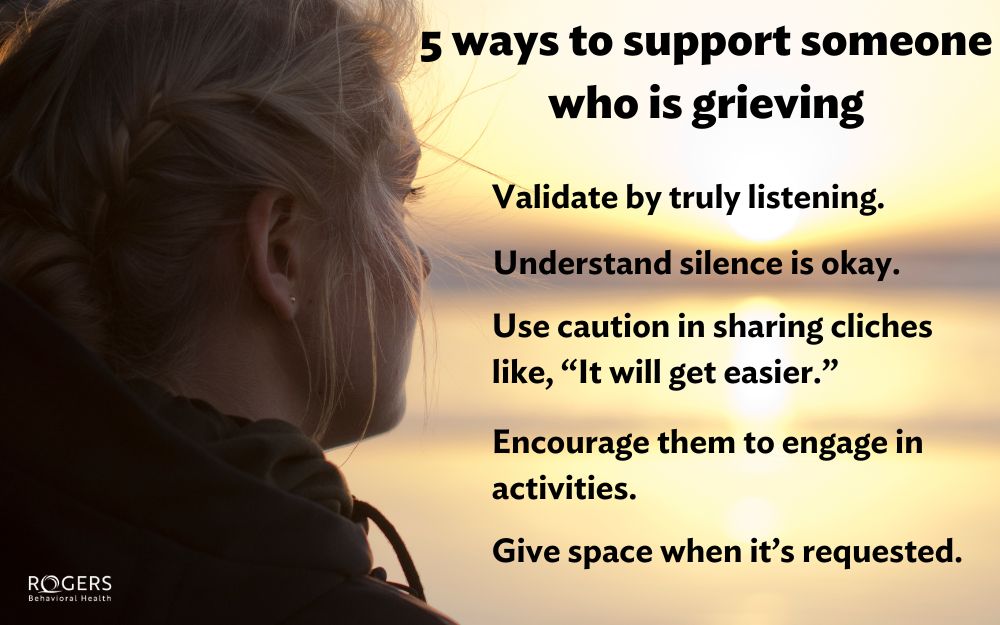By Lindsey Samuelson, MSW, therapist, Rogers Behavioral Health in Eden Prairie
Loss of a loved one is like nothing else, stirring intense feelings of sadness, shock, and anger, and sometimes guilt and regret. People also feel loss when kids leave home, a relationship ends, a pet dies, they lose a job, have a terminal diagnosis, or experience a major life change, like a divorce or a move. Grief is a natural response to loss and is a complex and very personal process. Rogers’ Lindsey Samuelson explains what grief looks like and how to show up for someone who is dealing with loss.
How are mental health and grief connected?
Sadness is a normal emotion for someone who is grieving. In fact, depression can be part of grief, in addition to denial, anger, bargaining, and acceptance of the loss. Depression can look like someone staying in bed for two weeks and losing interest in maintaining relationships or participating in activities. It’s important that in the midst of grieving, people continue to find ways to take care of themselves and do the typical tasks of daily living, like eating and showering. It takes about two weeks to develop a habit, so not getting out of bed can develop into a new normal if we aren’t mindful of that.
Depression during grieving can turn into a bigger concern when it is persistent and accompanied by feelings of hopelessness and suicidal ideation. A person experiencing depression is holding onto their emotions, rather than finding ways to work through them. Additionally, if people already have depression and anxiety and don’t allow themselves to grieve, they will likely experience an increase in their symptoms.
Grief changes our biological motivation to learn and grow. We can lose our desire to explore and experience new things. This ability is also linked to attachment. When we grow attached to something and lose it, our bodily systems can shut down due to the loss. It can make us feel less competent and less connected to others due to not having the motivation or the ability to learn and grow while grieving
A person’s upbringing can impact the grieving process, depending on whether crying or showing emotion was acceptable within the family.
What does grief look like?
As part of the grieving process, it’s helpful for people to acknowledge that they are grieving and allow themselves to feel and work through their emotions, seeking support as needed. Mourning is a natural part of the healing process. It can be helpful to think about positive memories associated with the person or whatever has been lost.
Grief can look like
- Avoiding reminders of the loss, including people and places
- Suppressing emotions
- Not working through the grief
- Loss of interest, including in things a person usually enjoyed
When might a grieving person consider professional help?
Grief looks different for everyone. Many people can suppress grief for long periods of time and believe they’re fine and go about their daily lives to the best of their abilities. There isn’t a time limit on when someone should seek professional help, and from my experience working with people in the mental health field, the longer someone waits, the harder it is. If anyone reading this is grieving and has the thought, “Maybe I should talk to someone?” then the answer is yes. You know yourself best.
Seek help especially if you’re struggling long-term with:
- Saying the name of the person you lost
- Hearing other people say the person’s name
- Continually crying while talking about the loss
- Suppressing thoughts about the loss and not acknowledging emotions that arise
- Feeling hopeless, not engaging in daily activities
5 ways to support someone who is grieving
- Validate. Truly listen to the person, giving your complete and total attention.
- Understand that there are times when you don’t need to say anything and just your presence may sometimes be what is needed.
- Use caution in saying common cliches like, “It will get easier.” Ask yourself whether you know that for certain. The hope is that it will, but truthfully, we don’t always know. Tone of voice and body language have a big impact on how messages are received.
- Encourage the person grieving to do things again, gently reminding that it doesn’t mean they’re forgetting the person or thing that they’re grieving.
- Give people space when they ask for it, and equally important, provide that safe space when they need it.
Grief and depression can be very tricky to navigate. It’s important to remember you are not alone and it’s never too late to start your healing journey.
How Rogers can help
If you or a loved one is struggling with mental health or addiction, Rogers has compassionate teams across the country ready to help. Call 800-767-4411 for a free, confidential screening.


